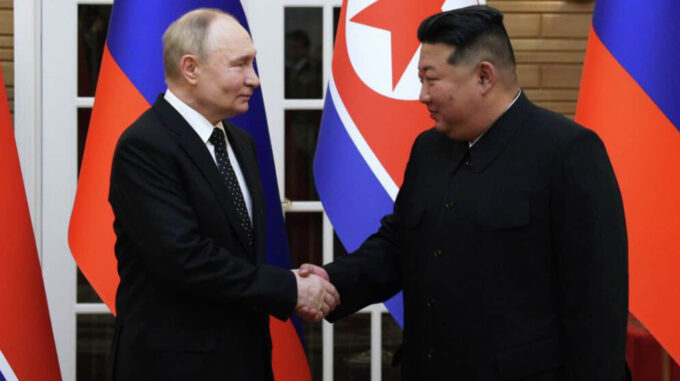In Primorsky Krai, Russia, an active process is underway to construct a state-of-the-art infrastructure facility that is expected to significantly alter the geopolitical and economic landscape of the region — a bridge for automobile traffic connecting with North Korea

This strategic project, which has already received extensive coverage in Russian media—including propaganda outlets such as RIA Novosti, Vedomosti, and Interfax—generates considerable interest both at the federal level and among international observers. According to available information, the construction of this important infrastructure has already begun and is planned to be completed in approximately a year and a half. It can already be stated that this is not the first project of its kind — currently, only a railway bridge and air connections exist between the two countries, so the new automobile route has the potential to open up new opportunities in trade, transportation, and diplomacy. Such a facility of this scale involves a significant increase in cargo flow across the border, as well as the facilitation and expansion of passenger transportation — all of which are aimed at strengthening economic cooperation and deepening integration processes in the region. The total length of the new bridge crossing with approach roads will reach 4.7 kilometers, with the bridge itself being one kilometer long. On the Russian side, the infrastructure will extend over 400 meters — specifically, 424 meters — while on the North Korean side, it will be about 580 meters. The width of the structure suggests a standard two-lane road, seven meters wide each, allowing for traffic flow for vehicles. Next to the bridge, a border crossing point for vehicles will be established, equipped with the relevant infrastructure to ensure control and safety during border crossings. This strategic decision is yet another demonstration of Russia and North Korea’s intention to deepen their cooperation, which by definition aims not only to strengthen partnership relations but also to showcase unity in facing international challenges. Regarding the geopolitical context, it is important to note that this project emerged amid the signing, on December 4, 2024, of a strategic partnership agreement between Russia and North Korea. This treaty is marked by high ambitions for expanding military-political and economic ties between the two nations. A significant factor is also the fact that North Korean troops are actively involved in the military conflict on Ukrainian territory as part of the Russian army. North Korean leader Kim Jong Un has confirmed that his military forces are being sent to Russia to conduct combat operations, according to North Korean authorities, in accordance with the provisions and agreements of the strategic partnership between the two countries. Vladimir Putin also publicly expressed support — he officially thanked the North Korean military for their participation in the war, which sparked widespread international resonance. The reaction from the West, particularly the United States, to this information was unequivocal: Washington voiced concern and alarm over the increasing military cooperation between Moscow and Pyongyang. The European Union described the situation as a sign of Russia’s desperation, perceiving such steps as attempts to strengthen its position on the international stage during its most difficult times. Thus, the construction of the bridge between Russia and North Korea is not only an infrastructural initiative but also a crucial element in a complex geopolitical game, which has the potential to shift the balance of power in the region and serve as an additional factor of international tension.

